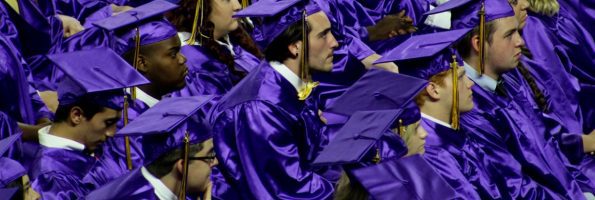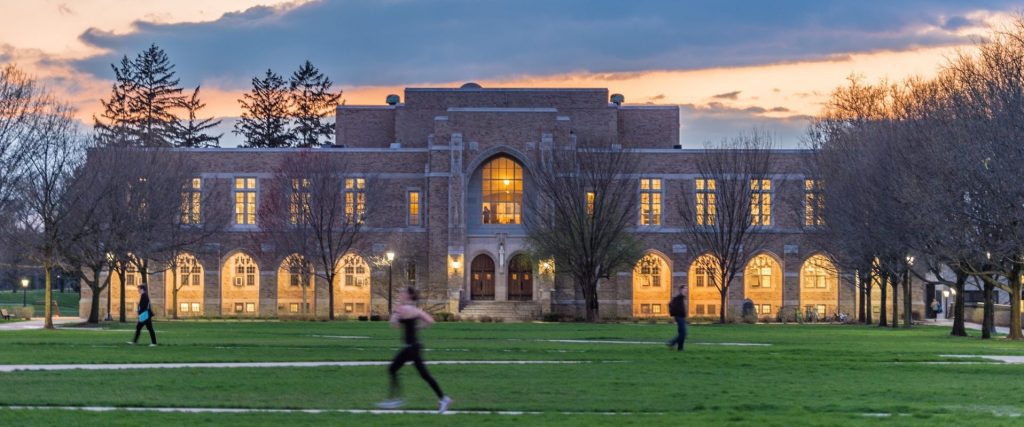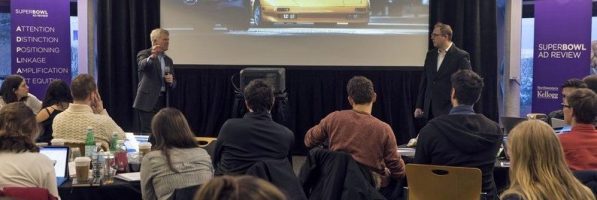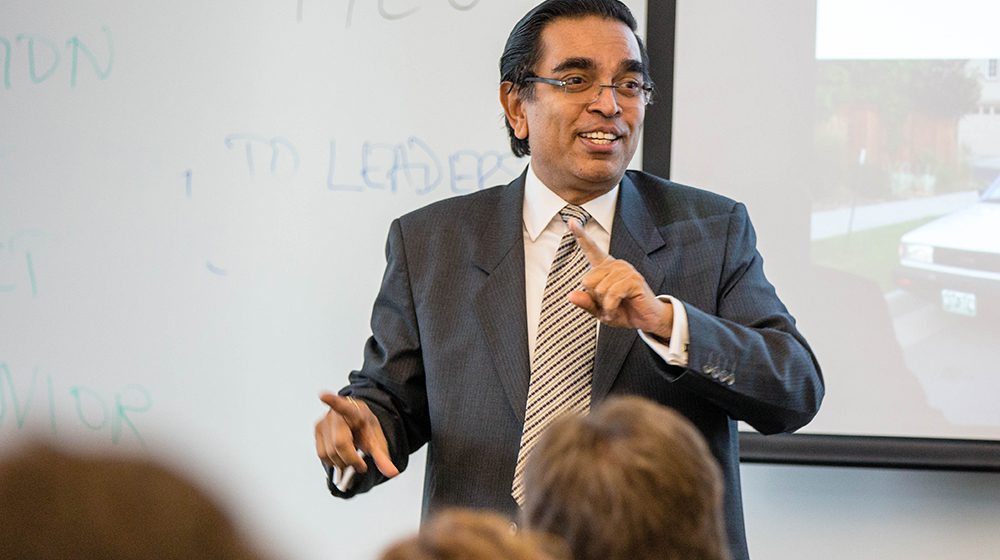U.S. News Reveals Sneak Peek of Its 2019 Business School Rankings

With just over a week before U.S. News & World Report reveals its eagerly-anticipated 2019 best business school rankings, the publication offered a sneak peek of the business schools that managed to earn spots within the top 10.
Unsurprisingly, the top 10 of the 2019 rankings resembles the publication’s 2018 edition, with nine out of the top 10 schools nearing the top of the annual list. The lone ranking variation from 2018 to 2019 will be the University of Michigan Stephen M. Ross School of Business, which came in 11th in the previous year.
The top ten business schools for the 2019 U.S. News rankings are as follows (unordered):
- The Wharton School at the University of Pennsylvania
- Harvard Business School
- The Booth School of Business at the University of Chicago
- The Kellogg School of Management at Northwestern University
- The Ross School of Business at the University of Michigan
- The Tuck School of Business at Dartmouth University
- The Sloan School of Management at MIT
- The Stanford Graduate School of Business
- University of California—Berkeley (Haas)
The one school left out of the newest rankings from the previous edition was the Yale School of Management.
The publication will release the full list of the 2019 best business school rankings will officially arrive on March 20, 2018. Stay tuned for more updates on the rankings on MetroMBA.
What Chicago MBAs Can You Earn the Fastest?

Here’s a lesson everyone learns well before ever stepping foot into business school: time is money.
Some students want to complete their MBA coursework as quickly and efficiently as possible. That’s where accelerated MBA programs come into play: in only 12 months, those who earn an accelerated MBA reenter the job market ready to start their next career.
Accelerated programs— also known as One-Year MBA programs—are designed for students who have clear ideas for what they want to do after graduation, as well as those who already have a strong base in business.
While one-year MBA programs are popular in Europe, they are less common in the U.S. However, several top business schools in the Chicago metro feature accelerated MBA programs.
Let’s take a look:
University of Illinois at Chicago Accelerated MBA Program – Under 12 Months
The Liautaud Graduate School of Business Accelerated MBA launched in fall 2015 and was designed for recent graduates or students with limited work experience to develop knowledge of business principles and skills in three semesters of full-time study.
Students begin the program by taking core courses—financial accounting, corporate finance, marketing, microeconomics, operations management, and organizational behavior—before moving on to advanced electives. Core coursework is completed in a cohort during the fall and spring semesters. The final semester may be completed in the summer semester or in the subsequent fall semester. This degree can be completed in under one year by students who carry a heavy course load each semester.
Kellogg Accelerated MBA – 12 Months
The Northwestern Kellogg School of Management was the first top-tier business school to offer a One-Year MBA program, launching the program more than 50 years ago. The degree option was designed for students who have both a business-related degree and several years of work experience. Fun fact: Kellogg has increased the size of the accelerated program by nearly 20 percent over the past two years.
Kellogg’s Accelerated MBA allow students to bypass core classes. Required courses are taken in the summer, and elective courses taken in the fall, winter, and spring. Students take at least two summer courses in Leadership and Business Strategy, a Crisis Management half credit course right before the fall term, and then join second-year MBA students for the final 13 courses before earning their degree.
Notre Dame One Year MBA Program – 12 Months
Notre Dame University’s Mendoza College of Business’ One Year MBA, located just outside of Chicago on the border of Indiana, begins in May and ends the same month of the following year. The program starts with a 10-week summer session before students join classes with other MBA students in the fall and spring. Summer courses include leadership & organizational behavior, marketing management, and strategic essentials. Following the summer session classes, students declare a concentration in either business analytics, business leadership, consulting, corporate finance, innovation & entrepreneurship, investments, or marketing.

The immersive Mendoza College of Business’ One Year MBA includes international expeditions / Photo via morrisinn.nd.edu
Notre Dame’s One Year MBA also has an international immersion option. Between fall break and Christmas, one year students take a full schedule of MBA courses in partnership with Universidad Catholica in Chile. In addition to business courses in English, students will have the opportunity to learn or improve their Spanish language skills. These class feature numerous travel opportunities for students to explore the Andes region, including trips to Chile’s Atacama Desert, Machu Picchu in Peru, and multi-day trekking in Patagonia. Read more about Mendoza’s Global Opportunities here.
Northern Illinois University One Year MBA Program – 12 Months
Unlike most accelerated programs, NIU’s One-Year program accepts one cohort each winter. Classes begin in January and students finish coursework in 12 months by attending class just two evenings per week. Classes are further broken down into groups, which are expected to meet up at least once per week outside of normal classroom hours.
The program also includes a nine-day international trip, which is usually scheduled in March. These experiences generally include a combination of company visits, government briefings, and university lectures. Recent international immersions have had students visiting places like Lisbon and Barcelona.
Northern Illinois University Fast Trak MBA – 12 Months
NIU is also unique in that it offers two different MBA options that can be copleted in 12 months or less. The school’s Fast Trak MBA is a day-time, 12-month program with required international experiences in Bordeaux, France or Murcia, Spain. Students attend classes Monday through Friday during spring and fall semesters.
NIU’s Fast Trak MBA has all students enter and experience the program together and begins with a mandatory orientation session in mid-August for all students. The MBA program is broken up into five modules, with students taking between two and four courses during these five-to-eight week intensive class blocks. Students enrolled in the program also have the opportunity to earn a second Masters degree in International Management from IAE the Bordeaux University School of Management or a Master of International Management from the ENAE School of Business in Murcia, Spain.
For more information on Chicago MBA programs, click here.
How Natural Disasters Can Turn into Economics Disasters – Chicago News

Let’s explore some of the most interesting stories that have emerged from Chicago business schools this week.
Localized Natural Disasters Can Hurt an Entire Country’s Economy – Kellogg Insight
Northwestern Kellogg School of Management associate professor of managerial economics and decision sciences Alireza Tahbaz-Salehi set out to understand the large-scale economic implications of natural disasters.
Tahbaz-Salehi worked with Vasco Carvalho of the University of Cambridge, Makoto Nirei of the Ministry of Finance of Japan, and Yukiko Saito of the Research Institute of Economy, Trade and Industry in Japan. After the 2011 earthquake, “disaster-affected firms’ connections to companies outside the regions affected by the quake had a strong effect: these links accounted for a 1.2 percent decline in Japan’s gross economic output the year after the disaster.”

The aftermath of the 2011 earthquake in Japan hurt economic productivity for a lengthy period of time. Photo via Reuters
Tahbaz-Salehi says, “If these shocks start propagating from a firm to its customers, to its customers’ customers, and so on, they may also have an aggregate effect on the entire economy. But there have been almost no empirical studies to document whether these effects exist and how big they are.”
You can read more from Kellogg Insight here.
Hitting Rock Bottom After Job Loss Can Be Beneficial – Mendoza College of Business
To paraphrase Beckett, “Try, fail, try again, fail again, fail better.” Notre Dame Mendoza College of Business‘ Siegfried professor of entrepreneurship Dean Shepherd recently co-authored a study in Academy of Management Review with Indiana University’s Trenton Williams, which finds that on the road to success, failure is often the most revealing option.
“On the way down, we frantically do all sorts of things to try and repair the situation, and suffer as they fail. Bottoming out frees us from the misconception that the problems can be fixed, and in the process, frees us from other constraints and negative emotions and provides the conditions necessary to find a viable solution.”
He continues:
“‘A failed corporate executive might consider a variety of other potential roles,’ Shepherd says. ‘For example, sitting on the board of a nonprofit organization that is desperate for experienced managerial guidance, exploring government positions or running for office, working with startups, and so forth. Similarly, a failed entrepreneur might explore how skills learned in starting a business could be applied in a corporate setting, take standardized exams to be considered for law school or engage in other low risk exploration activities. In these cases, hitting rock bottom opens up myriad new opportunities.’”
Read more about the duo’s research here.
Would You Pay $20 a Day to Lease a Luxury Car? – Booth School of Business
University of Chicago Booth School of Business associate professor Daniel Bartels and the University of Rhode Island’s Stephen Atlas are scheduled to publish a new study in the Journal of Consumer Research entitled, “Periodic Pricing and Perceived Contract Benefits,” which finds that people “perceive more benefits from their purchases if they make payments on a periodic basis.”

Research from Booth shows that people feel their purchases are more valuable if its paid off in repeated cycles. Photo via NY Auto Show.
“Our framework and results suggest that periodic pricing can help people appreciate the benefits they accrue from a purchase. So, under the right conditions, marketers can encourage purchase with periodic pricing, even for significant sums of money.”
Read more about the duo’s research here.
Misty Johnson Named Business Dean – DePaul Driehaus College of Business and Kellstadt Graduate School of Business
As of March 1, the Driehaus College of Business and Kellstadt Graduate School of Business formally introduced its newest business college dean, Misty Johnson, Ph.D.
Johnson became the interim dean of the business college back in July, replacing former dean Ray Whittington. With her role now official, she has become the first-ever female dean of DePaul’s business school.
“Dr. Johanson has done a laudable job, and I’m pleased the college will continue to benefit from her leadership and expertise,” DePaul University Provost denBoer said in a press release.
“During her tenure this academic year, fall graduate business enrollment increased 16 percent; staff roles were reimagined to enhance the student experience; master’s program and center directors began collaborating more closely to support graduate program success, and the college forged stronger industry connections to support career opportunities. Johanson also launched a campaign with the Office of Advancement to raise $4 million for the college by the end of the academic year and exceeded the goal within the first six months.”
You can read more about the official appointment of Dr. Johnson here.
Chicago News: Northwestern on Bitcoin, Notre Dame Explores Psychopathy and More

Let’s explore some of the most interesting stories that have emerged from Chicago business schools this week.
New Cryptocurrencies, Same Old Problems – Kellogg Insight
Following Bitcoin’s record high $19,511 BPI at the end of 2017, which has already begun its slow steady decline (its BPI is around $10,800 as of Feb 19), folks outside the standard-issue Silk Road users and modern-day gold prospectors have begun to openly (and loudly) question whether we’re due for a global cryptocurrency takeover. Northwestern University Kellogg School of Management professor Sarit Markovich advises eager beavers to slow their rolls:
“There are certainly huge advantages to blockchain technology, especially when it comes to cross-border transactions. But I doubt we’re going to reach the point where decentralized cryptocurrencies replace cash or distributed ledgers replace central banks. There’s too much room for manipulation. Instead, it looks like the real innovation will occur within large institutions, which is not exactly democratization.”
Markovich goes on to note another problem with the current state of Bitcoin, which is the preponderance of “whales” mining the currency. He explains:
“In addition to ‘mining pools,’ there is also the problem of ‘whales:’ roughly 1,000 people own around 40 percent of all bitcoins. As the market continues to rise, there is a risk that some may be in a position to manipulate the market. For example, they could collude in an effort to drive the price of Bitcoin up, then cash out all at once—and perhaps even bet against the futures market.”
Read more about the future of cryptocurrency here.
Psychopaths Tend to Benefit and Flourish Under Abusive Bosses – Mendoza Ideas & News
Got a boss from H-E-double hockey sticks? You’re not alone. But what might make you unique is your ability to stand heat. It turns out some folks actually do quite well under cruel conditions. It also turns out that these folks might have more in common with Richard Ramirez or John Wayne Gacy than they’d care to admit, according to a new study by Notre Dame Mendoza College of Business assistant professor of management Charlice Hurst:
“We found that primary psychopaths benefit under abusive supervisors. Relative to their peers low in primary psychopathy, they felt less anger and more engagement and positive emotions under abusive supervisors.” “It may reward and retain exactly the kind of people who are likely to perpetuate abusive cultures,” she says. “Psychopaths thriving under abusive supervisors would be better positioned to get ahead of their peers.”
Hust continues, saying:
“If they have a problem of endemic abuse, like Wells Fargo — where former employees have reported that managers used tactics designed to induce fear and shame in order to achieve unrealistic sales goals—and upper-level managers are either unaware of it or are not taking action, they might notice increasing levels of engagement due to turnover among employees low in primary psychopathy and retention of those high in primary psychopathy. At the extreme, they could end up with a highly engaged workforce of psychopaths.”
Read more about Dr. Hurst’s research, entitled “Are ‘Bad’ Employees Happier Under Bad Bosses? Differing Effects of Abusive Supervision on Low and High Primary Psychopathy Employees,” here.
Financial Compensation Can Distract From Emotional Suffering – Chicago Booth Review
University of Chicago Booth School of Business professor Christopher Hsee, Northwestern professor Xueer Yu and Ph.D. candidate Shirley Zhang recently explored the complex analysis required to compensate victims who suffer grave psychological, physical, and financial duress.
What the trio found, surprisingly, is that psychological and physical distress was often much more rewarding than financial damage. And even mentioning financial damage, coupled with psychological and physical damage, often hindered compensation.
The reason? Financial damage is generally empirical and can be exacted with ease.
“It would be better to say ‘I was so scared that I lost two nights’ sleep’ than to say ‘I was so scared that I lost two nights’ sleep and one day’s work,’” the researchers write. “If the victim mentions one day’s work, the mediator would likely compensate the victim for only her one day’s pay. If the victim does not mention one’s day work, the mediator would likely award more, unless the victim has a high-paying job and the judge is aware of it.”
Read more about their research, recently published in the January issue of Organizational Behavior and Human Decision Processes, here.
Amazon, Philly Win Super Bowl According to Northwestern Kellogg

Philadelphia football fans took to the streets, toppling cars, scaling street lamps, and setting at least one fire to celebrate their beloved Eagles’ first-ever Super Bowl win, 41 to 33 against the New England Patriots. But according to MBA students at Northwestern’s Kellogg School of Management, e-commerce giant Amazon was the victor in terms of best ads of the night.
On Sunday, as the game got underway in minus-2-degree Fahrenheit Minneapolis, approximately 50 Kellogg students teamed up with marketing professors Tim Calkins and Derek Rucker to determine the night’s winners and losers in the battle of the brands. Advertisers spend more than $2 billion each year and roll out highly anticipated Super Bowl commercial spots in an effort to imprint their brands in the minds of millions of spectators—some wowing and others bombing in the process.

Kellogg students watch commercials during the Super Bowl at the Allen Center Atrium in Evanston, Illinois, February 4, 2018. Photo by Jim Young for Kellogg
Armchair spectators around the world pick their own winners and losers among the ads, but for the 14th year running, Kellogg students applied a unique framework for evaluating an ad’s brand-building potential as part of last night’s 2018 Kellogg School Super Bowl Ad Review. Using the ADPLAN framework to evaluate each ad according to six critical criteria—Attention, Distinction, Positioning, Linkage, Amplifications and Net Equity—the Kellogg students determined the winner of the night to be Amazon with its “Alexa Loses Her Voice” commercial spot. Also scoring highly were Mountain Dew, Doritos, Tide, Avocados from Mexico, and Wendy’s.
Joining the Pats in defeat, according to the Kellogg review, were Squarespace and T-Mobile, which each received “F” grades for least effective advertising during the game.
“Amazon used a cast of celebrities that focused us on the brand, reinforced the equity in Alexa, and ultimately was fun to discuss and share with those around you,” Professor Rucker said in a statement. The Amazon ad included appearances by Cardi B, Rebel Wilson, and Amazon CEO Jeff Bezos. “However, Squarespace and T-Mobile both missed the mark with questionable positioning and unclear calls to action,” continued Rucker.

Kellogg students analyzing Super Bowl ads in real time. Photo by Jim Young for Kellogg
Professor Calkins called attention to two trends that emerged across the big game’s ads—a competitive angle and philanthropy. “As competitive as the game was, the category wars were equally competitive,” Calkins said in a statement. “For example, there was hard hitting competition in the wireless wars with some brands calling one another out,” he noted. In addition to poorly performing T-Mobile, wireless advertisers included Sprint and Verizon, which the Kellogg student review team each awarded “B” grades.
“Many brands tried to appeal to viewers through philanthropic causes, including Toyota, Ram, and Hyundai,” Calkins added. Ram, for its part, sought to sell its trucks using images of people helping others with a sermon given by Dr. Martin Luther King, Jr. as the voice over. The ad concluded with the phrase “Built to Serve” flashed on the screen alongside a Ram logo. Unfortunately for Ram, the social media backlash was fast and furious.
“A Martin Luther King Jr speech to sell @Dodge Ram trucks? Totally offensive #mlk,” wrote one user on Twitter.
Several other tweets expressed similar sentiments:
There was audible painful groaning at the Super Bowl party I’m at as everyone realized Dodge Ram was trying to profit off of an MLK speech
— Hunter Walker (@hunterw) February 5, 2018
Not sure MLK’s dream was to drive a Dodge Ram.
— ItsTheReal (@itsthereal) February 5, 2018
“I have been to the mountaintop. And I got there in a Ram truck.” – MLK
— SportsPickle (@sportspickle) February 5, 2018
The Kellogg student team gave the Ram commercial a “C” grade overall, but Calkins had more to say in an interview with the New York Times. “It’s the wrong mistake to make given everything that’s going on in the U.S. right now,” he told the Times. “There’s so much emotion right now around race in this country that this was a high-risk move, and clearly it’s not going over very well,” he continued.
“I think it was well intentioned, but they’re going to have a lot of explaining to do,” Calkins continued. “They did not release this ahead of time, so they went for the surprise. They got that, but at the same time they now have a big problem with feedback and people being upset.”
Though many on Twitter directed their ire toward Dodge—the Detroit-based car manufacturer founded by two brothers of that name in the early 1900s—the Ram Truck brand was officially separated from the Dodge car brand in 2009 as part of an acquisition by Italian automaker Fiat S.p.A. Its successor, Fiat Chrysler Automobiles, is the current owner of the Ram Tuck brand.
Perhaps some of the confusion around brand will be a boon to Ram’s owner as it attempts to recover from its Super Bowl fumble. As for whether ad champion Amazon will look favorably on football champion Philadelphia as a spot for its future HQ2—another topic of speculation on social media last night—only time will tell. What we do know is that the students at Kellogg will carry lessons learned from advertising’s biggest night along with them into their future careers in marketing.
For the full 2018 Kellogg School Super Bowl Ad Review results, click here.
To learn more about the Kellogg School Super Bowl Advertising Review, click here.
This article was republished with permissions from our sister site, Clear Admit.
Quinlan Professor Heads to India as new Fulbright Scholar

Arup Varma is taking part in the research project of a lifetime. The professor of management at the Loyola University Quinlan School of Business and recently-named Fulbright Scholar will spend five months in India participating in the prestigious Fulbright exchange.
According to the Quinlan School, Varma will study the performance management of expatriates and develop a model that can be used by multinational companies worldwide as they develop their performance management systems. There is currently no proper model in the academic literature for evaluating expatriates when they are working in other countries.
“I decided to combine two topics of interest to me: performance appraisal and expatriates,” Varma said. “My Ph.D. advisor once told me that the best research topics come out of your personal experiences, and both of these topics are very close to my heart.
Varma will be hosted by the Indian Institute of Management, Lucknow, one of the top business schools in India. While collaborating with faculty and doctoral candidates from Lucknow, he will travel the country and meet with top HR leaders and expatriates to learn how they are evaluated and managed.

Professor Arup Varma/Photo by Heather Eidson.
There is also some altruism behind Varma’s decision to be a Fulbright in India: the Quinlan professor wanted to help his home country in whatever way he could.
“It is clear that academic research in India has started to improve, but is not yet where it should be,” he said. “As I grew up and studied there, the least I can do is pay it back, and help the academic environment there move to the level that it needs to be and play a global leadership role.”
Varma has studied expatriate work issues for the past 15 years, and his research on expatriate issues has been published in notable peer-reviewed journals including the Journal of Managerial Psychology, the International Journal of Human Resource Management, and the European Journal of International Management.
“It is also a great honor as a faculty member and for Loyola. It means we are not just a good teaching school, but we are also a good scholarship school and that continues to be reinforced. I have been very lucky that Quinlan has been very supportive of those of us interested in pursuing research.”
You can read more about Varma’s work and upcoming trip here.
